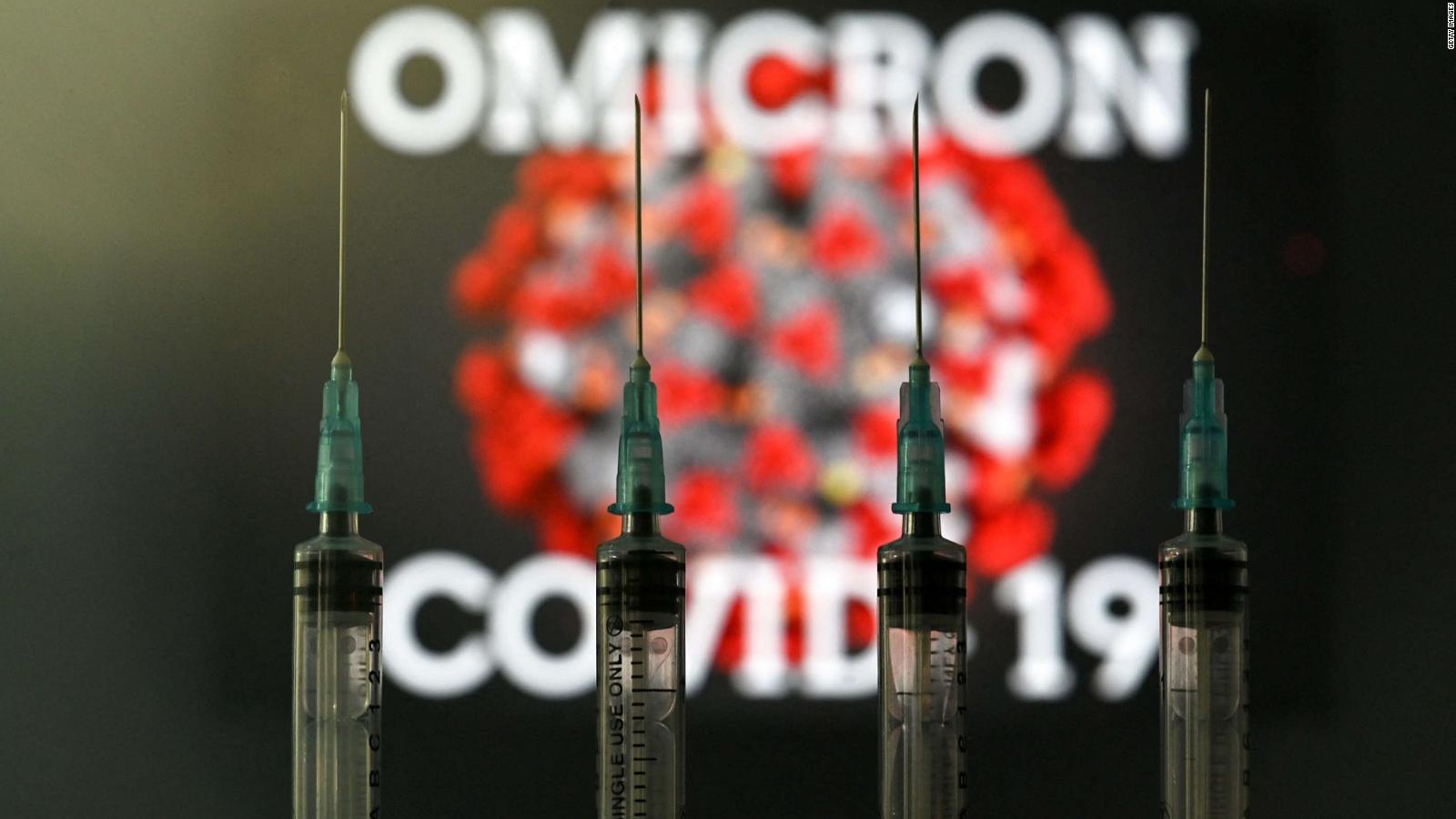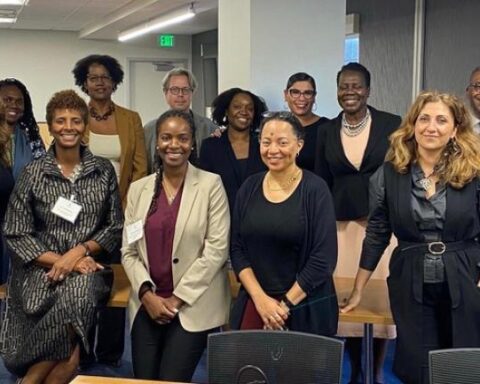The Omicron winter is coming.
The ravenously infectious variant expected to become the dominant strain of Covid-19 in the US within weeks threatens to deal another blow to the morale and resolve of a nation already reeling under an assault by its viral Delta cousin.
“It’s here now and it’s spreading and it’s going to increase,” President Joe Biden warned Thursday, girding for another battle with a pathogen that is defining his presidency and further clouding Democratic hopes for the 2022 midterm elections. “For the unvaccinated, we are looking at a winter of severe illness and death for the unvaccinated — for themselves, their families and the hospitals they’ll soon overwhelm.”
Biden’s striking language was followed by an even more alarming scenario painted by Michael Osterholm, director of the Center for Infectious Disease Research and Policy at the University of Minnesota.
“I think we’re really just about to experience a viral blizzard,” Osterholm told CNN’s Erin Burnett. “I think in the next three to eight weeks, we’re going to see millions of Americans are going to be infected with this virus, and that will be overlaid on top of Delta, and we’re not yet sure exactly how that’s going to work out.”
It is not all bad news for all Americans, however. This is not 2020. While the new variant is likely to cause more breakthrough infections, vaccines — when combined with boosters — still appear to offer high protection against severe disease with Omicron, as well as against Delta, which is still the major viral troublemaker. And while the current Delta wave is triggering a flurry of college shutdowns and shuttered Broadway shows, the fear of more online school, and canceled pro-sports games are an inconvenience, most Americans who got their shots are far safer than they were before.
But another wave of infections, hospitalizations and deaths fueled by a new variant, especially among the unvaccinated, would still represent another blaring crisis for a White House already beaten down by a year-long battle with a pandemic that Biden vowed as a candidate to end.
A fresh assault from a virus with an uncanny ability to expose the nation’s divides will open new schisms over masking, vaccine mandates and school closures — and offer new openings for politicians looking to make a mark for themselves.
But with the worst public health crisis in 100 years about to enter its third year, an Omicron surge will not simply be a replay of the awful Groundhog Day of cascading misery that has unfolded since March 2020. There are increasingly profound and delicate questions about how long the country can bear the privations of ruined family lives, throttled schooling and punishing economic consequences that come with precautions designed to fight the coronavirus.
Biden’s mantra was that he would always put science first, following a first year of the pandemic that was disastrously managed by then-President Donald Trump. But do social, economic and emotional consequences that are piling up, nationally and for individuals, make it incumbent on Biden to at least consider a modified approach? When does the moment come when Covid-19 must be considered an endemic threat with which Americans must live in perpetuity? What level of sickness and death is a polarized country prepared to accept in a return to some version of normality? There are still no definitive studies about the character of the variant. But if the preliminary suggestions about Omicron symptoms being more mild are borne out by experience and scientific data, what justification is there for treating the disease differently than influenza or the common cold?
But with infections spiking even before Omicron’s arrival and at a moment when 1,300 Americans a day are still being lost to the disease and tens of millions of people are still risking death by refusing inoculation, even raising these questions risks whipping up a furor.
And if there is one lesson of the last two years, it is that the virus itself defies all political and human timetables and attempts by leaders to chart an exit from the crisis. For example, in July, Biden said at a July Fourth party on the White House lawn that the country had never been closer to beating the pandemic. But Delta had already dug in for an assault that brought a summer of sickness and death. Even a few weeks ago, booster shots were seemingly set to conquer Delta among those who wanted them. But then the world was set back on its heels yet again by the discovery of Omicron in South Africa.
How Omicron could take a savage grip on US life
If the United States benefited from a White House that had proven its ability to outpace the virus’ twists and turns, was blessed by an opposition Republican Party that put public health before politics and had a majority populace prone to trust its leaders, the next stage of the pandemic might prove less onerous. But in the absence of all that, it’s likely that the coming new bout with the disease will be as politically and socially painful as previous engagements. That the new variant is arriving in time for a bitter midterm election year will hardly help.
Even if Omicron is more mild, it could still land vast numbers of Americans in hospitals and cause many deaths — by virtue of the volume of infection. And even if most Americans suffer only mild symptoms, the increased contagiousness of the variant compared to Delta means that many more people will test positive.
Currently, the US Centers for Disease Control and Prevention advises people who test positive to isolate for 10 days. If millions of Americans suddenly become infected, the new variant could cause chaos.
Parents will worry that lessons will go back online if teachers have to stay home — triggering shockwaves in the economy since many parents of young kids have no other source of child care. If lots of people become infected and have to isolate, it could cause disruption for staffing in transport, shipping, retail and possibly even emergency services.
Dr. Peter Hotez, dean of the National School of Tropical Medicine at Baylor College, said on Thursday he was especially concerned about Omicron’s impact on health care workers. Doctors and nurses have spent agonizing months on the Covid frontlines. Many are suffering exhaustion, extreme stress and in some cases are leaving the profession. Since they were among the first to receive booster shots, it’s possible their immunity is already waning, even if the three-dose regime does offer around 75% protection against symptomatic infection with Omicron.
Hotez weighed in on the idea of a second booster shot for this community. “All of this needs to be put on the table,” Hotez said. Osterholm added: “I’ve been very concerned about the fact that we could easily see a quarter or a third of our health care workers quickly becoming cases themselves.”
Such questions will pile even more pressure on top of public health experts like Dr. Anthony Fauci, who have battled Covid since the start and have been battered by the country’s bitter political feuds. It also will further stretch a White House that has looked outmatched in recent weeks by a cluster of political crises, with Biden acknowledging Thursday that Democrats will miss their Christmas deadline to pass his signature economic and climate package as negotiations continue.
Another political reversal for Biden
There is no doubt that Omicron’s arrival represents another political cataclysm for Biden. Apart from being rattled by the virus, his whole presidency has suffered in recent months from the stalling of his agenda in Congress, soaring inflation, high gas prices and a debacle in Afghanistan.
There has been modest progress in unpicking a supply chain crunch caused by Covid infections in manufacturing hubs overseas and shortages of truckers and port space in the US. And weekly jobless claims are lower than they’ve been for more than 50 years. But that could all change if the economy is thrown into reverse by new lockdowns, or simply by Americans wary of the virus staying home from restaurants, shops and avoiding travel.
Even a tussle with Omicron that lasts only into early spring could further sour an acidic mood that seems likely to punish incumbents and inflict an even more devastating blow on Biden in the midterms than history warns all first-term presidents to expect.
For now, however, Biden must steel citizens for another dark encounter with a virus that has changed the character of their lives. Most immediately, difficult questions lie ahead about how to gather in the holiday season amid fading hopes that this year’s festivities will actually be … festive.
“If we’re all going to get together, we should all be vaccinated, and … boosted,” Dr. William Schaffner, a professor of preventive medicine at Vanderbilt University, told CNN’s Alisyn Camerota Thursday.
“We should wear our masks if we’re uncertain, and another thing we could do is we could all get tested the morning of our getting together,” he said.
“I would recommend that we hang our stockings with care.”







